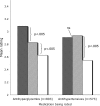Diabetic patients' medication underuse, illness outcomes, and beliefs about antihyperglycemic and antihypertensive treatments
- PMID: 18852334
- PMCID: PMC2606823
- DOI: 10.2337/dc08-1533
Diabetic patients' medication underuse, illness outcomes, and beliefs about antihyperglycemic and antihypertensive treatments
Abstract
Objective: The purpose of this study was to determine how patients' beliefs about antihyperglycemic and antihypertensive medications relate to medication underuse and health status.
Research design and methods: In diabetic patients from an economically distressed region, we assessed perceived necessity and harmfulness for antihyperglycemic (n = 803) and antihypertensive (n = 573) medications, past year's medication underuse, A1C, systolic blood pressure (SBP), and diastolic blood pressure (DBP).
Results: After correction for multiple analyses, multivariate models indicated that perceived need for antihyperglycemic medication was associated with being younger, being prescribed insulin, and being prescribed multiple medications. Concern about antihyperglycemic medications was associated with being younger, African American, dissatisfied with information received about medication, and of low health literacy. For antihypertensives, perceived necessity was associated with having numerous medical comorbidities and being dissatisfied with medication information; concern was associated with being younger, dissatisfied with information received about medication, and of low health literacy. Up to one-half of patients underused at least one of the types of medication; many of these patients attributed this underuse to cost. For both types of medications, concern was significantly associated with both cost-related and non-cost-related underuse, and antihypertensive concern was associated with higher SBP and DBP.
Conclusions: Even after adjustment for economic factors, patients who are younger, African American, or of low health literacy are especially concerned about medication harmfulness, which is in turn associated with medication underuse and higher blood pressure. To enhance adherence and outcomes, interventions should address patients' underlying concerns about potential adverse treatment effects and focus on both cultural factors and health literacy.
Figures
References
-
- Horne R, Buick D, Fisher M, Leake H, Cooper V, Weinman J: Doubts about necessity and concerns about adverse effects: identifying the types of beliefs that are associated with non-adherence to HAART. Int J STD AIDS 15:38–44, 2004 - PubMed
-
- Clatworthy J, Bowskill R, Rank T, Parham R, Horne R: Adherence to medication in bipolar disorder: a qualitative study exploring the role of patients’ beliefs about the condition and its treatment. Bipolar Disord 9:656–664, 2007 - PubMed
Publication types
MeSH terms
Substances
Grants and funding
LinkOut - more resources
Full Text Sources
Medical
Miscellaneous


